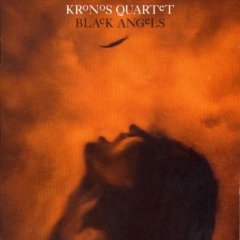 Os CDs do quarteto de cordas Kronos sempre fizeram minha alegria. O grupo existe há 34 anos e sempre faz trabalhos muito originais ligados à música moderna. Não surpreende o fato de terem estreado mais de 400 obras dedicadas a eles, algumas escritas por conhecidos nossos, como Piazzolla, Górecki, Reich, Boulez, etc. Ultimamente – pasmem! -, têm se apresentado com Tom Waits…
Os CDs do quarteto de cordas Kronos sempre fizeram minha alegria. O grupo existe há 34 anos e sempre faz trabalhos muito originais ligados à música moderna. Não surpreende o fato de terem estreado mais de 400 obras dedicadas a eles, algumas escritas por conhecidos nossos, como Piazzolla, Górecki, Reich, Boulez, etc. Ultimamente – pasmem! -, têm se apresentado com Tom Waits…
Mas fiquemos na música erudita. Há um CD de música erudita africana para quarteto de cordas que vou lhes contar… ou postar algum dia… quem sabe?
Este fantástico Black Angels (1990) é um CD sobre a guerra e a morte.
Inicia com a obra que dá nome ao CD, uma ode ao Vietman do norte-americano George Crumb (1929- ). Se o primeiro movimento é bastante assustador, o segundo começa por uma citação de A Morte e a Donzela de Schubert e finaliza com outra citação facilmente reconhecível mas que não consigo pescar na memória.
Thomas Tallis (1510-1585) parece estar como um peixe fora d`água neste trabalho do Kronos, porém o texto em que se baseia o moteto para 40 vozes Spem in Alium conta uma batalha bíblica.
Doom, a Sigh de Istvan Marta (1952- ) incorpora uma gravação autêntica de duas mulheres romenas lamentando a morte de parentes e amigos. É difícil ouvir até o fim o idioma universal da dor.
Depois, o completo contraste. Temos algo pra lá de espalhafatoso e engraçado. O compositor erudito americano Charles Ives (1874-1954) canta sua “Marcha Militar” They are there! (1917) de forma inacreditável. Exatamente, Ives canta! Trata-se de uma canção que escreveu “dedicada” à Primeira Guerra Mundial. A gravação de Ives é acompanhada discretamente pelo Kronos. Espantoso. Vale a pena conhecer a letra de They are there! (Fighting For The People’s New Free World):
There’s a time in many a life,
when it’s do though facing death
and our soldier boys will do their part
that people can live in a world where all will have a say.
They’re conscious always of their country’s aim,
which is Liberty for all.
Hip hip hooray you’ll hear them say
as they go to the fighting front.
Brave boys are now in action
They are there, they will help to free the world
They are fighting for the right
But when it comes to might,
They are there, they are there, they are there,
As the Allies beat up all the warhogs,
The boys’ll be there fighting hard
a-a-and then the world will shout
the battle cry of Freedom.
Tenting on a new camp ground.
When we’re through this cursed war,
All started by a sneaking gouger,
making slaves of men (God damn them),
Then let all the people rise,
and stand together in brave, kind Humanity.
Most wars are made by small stupid
selfish bossing groups
while the people have no say.
But there’ll come a day
Hip hip Hooray
when they’ll smash all dictators to the wall.
Then it’s build a people’s world nation Hooray
Ev’ry honest country free to live its own native life.
They will stand for the right,
but if it comes to might,
They are there, they are there, they are there.
Then the people, not just politicians
will rule their own lands and lives.
Then you’ll hear the whole universe
shouting the battle cry of Freedom.
Tenting on a new camp ground.
Tenting on a new camp ground
O Quarteto de Cordas Nº 8 de Dmitri Shostakovich (1906-1975), de 1960, é dedicado às vitimas do fascismo e da guerra. É uma obra-prima que já postamos aqui algumas vezes, mas que teima em reaparecer.
Crumb, Tallis, Marta, Ives & Shostakovich: Black Angels (Kronos Quartet)
– George Crumb “Black Angels: Thirteen Images from the Dark Land”, for ampliflied/electric String Quartet (1970)
– Thomas Tallis “Spem in Alium” 40-part motet (circa 16th century) arranged by Kronos
– Istvan Marta “Doom: A Sigh,” (1989)
– Charles Ives “They Are There!” (1917/1942) arranged by John Geist
– Dmitri Shostakovich String Quartet No. 8 (1960)
Faixas:
1. Black Angels: I. Departure (5:37)
2. Black Angels: II. Absence (5:25)
3. Black Angels: III. Return (7:13)
4. Spem In Alium (Sing And Glorify) (8:52)
5. Doom. A Sigh (10:54)
6. They Are There! (2:47)
7. Quartet No. 8: I. Largo (4:57)
8. Quartet No. 8: II. Allegro Molto (2:36)
9. Quartet No. 8: III. Allegretto (4:19)
10. Quartet No. 8: IV. Largo (4:12)
11. Quartet No. 8: V. Largo (3:56)

PQP Bach